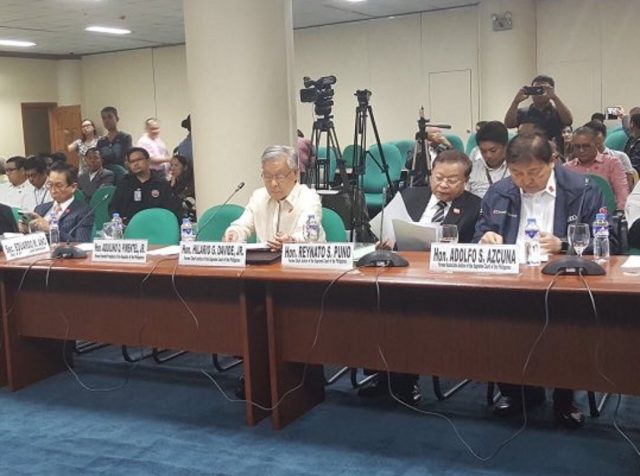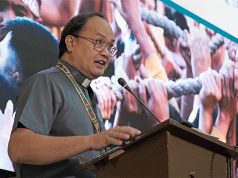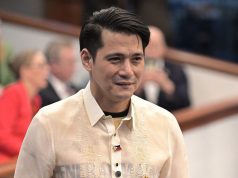
MANILA, Philippines — Former Chief Justice Hilario Davide Jr. sees “absolutely no need to amend or revise” the 1987 Constitution he helped draft, his fellow ex-Chief Justice Reynato Puno and former Senate President Aquilino Pimentel III believe it should be, but all three agree amendment or revision is best done through a constitutional convention.
But should a constituent assembly prevail, all three also agreed that the Senate and House of Representatives must vote separately on the proposed amendment, though they may hold joint sessions on revisions.
The three were resource persons at the Wednesday hearing of the Senate committee on constitutional amendments and revision on Charter change, a day after the House approved Concurrent Resolution No. 9 to constitute Congress into a con-ass.
The Duterte administration and the overwhelmingly pro-administration Congress is bent on fast-tracking Charter change to make way for a shift to a federal form of government.
However, major differences have emerged between the House and even administration allies in the Senate on how to amend the Constitution. And even senators who seem inclined towards a con-ass say voting on proposed amendments should be done separately by both chambers, not together as one body as the House insists.
Davide, a member of the 1986 constitutional commission that drafted the Charter, acknowledged it as imperfect but said he believed it is “the best” in the world and for the Philippines, calling it “pro-God, pro-life, pro-family, pro-marriage, pro-poor, pro-human rights, pro-women, and pro-environment” and containing enough provisions against the abuse of power while guaranteeing people’s active participation in governance, including the use of people power.
He also stressed that it is the only Constitution that institutionalizes the doctrine of public office as a public trust, “enshrining the servant leadership principle which Jesus himself proclaimed.”
“This is the Constitution I am willing to die for,” Davide, 82, said, echoing the words he first said during the drafting of the Charter.
Puno acknowledged “the unanimous view is that the ’87 Constitution restored our democracy. And more than restoring our democracy, the ’87 Constitution expanded the democratic space where our people can exercise their power of direct democracy.”
But, he stressed, it is now more than 30 years old and the political, social, and economic configuration of the world has changed.
“It is time to give the ’87 Constitution a look-over, a no-nonsense review,” he said, pointing to persistent calls to reconsider what have been called its “restrictive economic policies.”
At the same time he pointed out that Charter change to make way for federalism would leave only the Bill of Rights untouched.
Davide made it clear he is against federalism, calling it “a lethal leap, a fatal leap, a plunge of death, a leap to hell,” prompting Pimentel, who has always championed it, to rebut his “good friend”: “The proposal to revise the Constitution by adopting the federal system is not a lethal proposal; it is a vital proposal to give life and meaning to the intent of good governance and to provide good life to our people.”
At the same time, he also differed with Puno’s prediction of a radical overhaul, saying only “those parts that deal with the structure of our governmental setup and the powers that our government departments would exercise” should be revised.
“But let me emphasize that the good provisions of the Constitution should not be revised,” he added.
He justified the shift to federalism by saying the Local Government Code of 1991 “was primarily intended to diffuse the concentration of powers in the hands of Metro Manila government and give substantial powers and authority to define the lives and the welfare of the people in their own communities to the local government units.”
Despite this, he lamented, the central government in Metro Manila has refused to relinquish power over the Departments of Agriculture, Health, and Social Welfare and Development, even if these have already been devolved to local governments. A clear example, Pimentel said, was the aftermath of super typhoon Yolanda, when then Social Welfare Secretary Dinky Soliman was the one who went around distributing funds and relief to survivors in Samar and Leyte.
Davide did no dispute Pimentel’s contention but described current moves to shift to federalism are being rushed because of the “current obsession or infatuation of our leaders.” The only way to ensure a truly impartial and comprehensive discussion of the issue, he stressed, is through a constitutional convention.
Puno agreed, saying the Constitution has never been revised through con-ass.
Congress’ primary business is to make laws, and it needs to act on the many bills needing its consideration. Aside from this, it is currently busy tackling the impeachment complaint against Chief Justice Maria Lourdes Sereno.
“It shouldn’t be saddled with the more difficult job of rewriting the Constitution,” he said.
“Perhaps more importantly, some members of Congress may find themselves in a conflict situation in the course of writing or rewriting the Constitution. Issues like establishing a one-house parliament, abolishing the party-list system, regulating political dynasties, extending the term of sitting legislators may render the actions of those affected suspect to the public,” he stressed. “As early as now, we see the gathering cloud of suspicion on these issues.”
As to observations a con-con is more expensive, Puno said: “We should not count the cost when revising a Constitution.”
Pimentel also weighed in for a con-con, saying “delegates representing the provinces and highly urbanized cities are given the right to elect the delegates who would espouse their views of what changes should be done to the existing basic law, so that people are more empowered to address their desired goals to develop themselves and modernize their own communities.”
He then quipped that people should stop referring to the alternative mode of Charter change as “con-ass” lest “mischievous-minded people might be tempted to deride the effort as run by asses or mules, rather than by our respected representatives of both Congress.”
But if con-ass prevails, Pimentel batted for people’s “proactive” participation through fora to discuss their priority concerns for inclusion in the new Constitution.
Arguing why the House and Senate should vote separately on proposed amendments, Davide noted: “The power to propose amendments is given not to a unicameral body, but to a bicameral body.”
Puno gave the lawmakers a history lesson by saying the 1986 Constitutional Commission initially intended to establish a unicameral national assembly but in the end, decided to create a bicameral Congress.
However, in their haste, he said they failed to reword Article 17, Section 1 of the 1987 Constitution (which reads: “Any amendment to, or revision of, this Constitution may be proposed by: (1) The Congress, upon a vote of three-fourths of all its Members; or (2) A constitutional convention”), which is proper for a unicameral assembly, but improper for a bicameral Congress.
Puno said under the 1935 Constitution, Congress was bicameral with the chambers holding joint sessions but voting separately.
But the 1973, or Marcos, Constitution, changed this establishing a unicameral assembly.
In other words, said Puno, when a bicameral Congress convenes as a con-ass, “the intent, the tradition, and the practice is to make the two houses vote as separate and independent institutions.”
If not, he said, the “numerical superiority of the House will simply overwhelm the Senate.”
WATCH A RELATED NEWS5 VIDEO:









